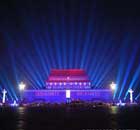Government and Policy
Nanjing drops life suspension for boozy motorists
By Wei Tian (China Daily)
Updated: 2010-02-25 07:33
 |
Large Medium Small |
The removal of a proposed rule from a local regulation in Jiangsu province which would have imposed a lifelong driving ban on convicted drunken drivers who cause severe accidents has triggered a new wave of controversy about the national campaign to crack down on drunken driving.
The move came although judges and law enforcement officials have sent clear signals through recent court verdicts and the proposal of new regulations that drunken drivers can expect harsher punishments.
The draft of the regulation was made public in July last year. The severe punishment for drunken drivers and some unusual laws, such as a ban on drivers wearing high heels over 4 cm, caused hot debate among the public. Both proposed laws were deleted from the final version.
Authorities in Nanjing said they removed the permanent license suspension from the regulation to make it consistent with the national law.
The newly edited national regulation by the Ministry of Public Security in December last year stepped up punishment for drivers under the influence of alcohol by deducting 12 points from their traffic records, which means offenders will have to spend one full week studying traffic rules.
"The regional law must not make independent rules in areas where the national law has done so, as regulated by the legislation law," said Wu Dong, a lawyer based in Shanghai.
"Nanjing's move was also out of humanitarian concern," Wu said. "As private transport becomes increasingly popular today, driving has gradually become a citizen right. Lifelong deprivation is simply too harsh."











